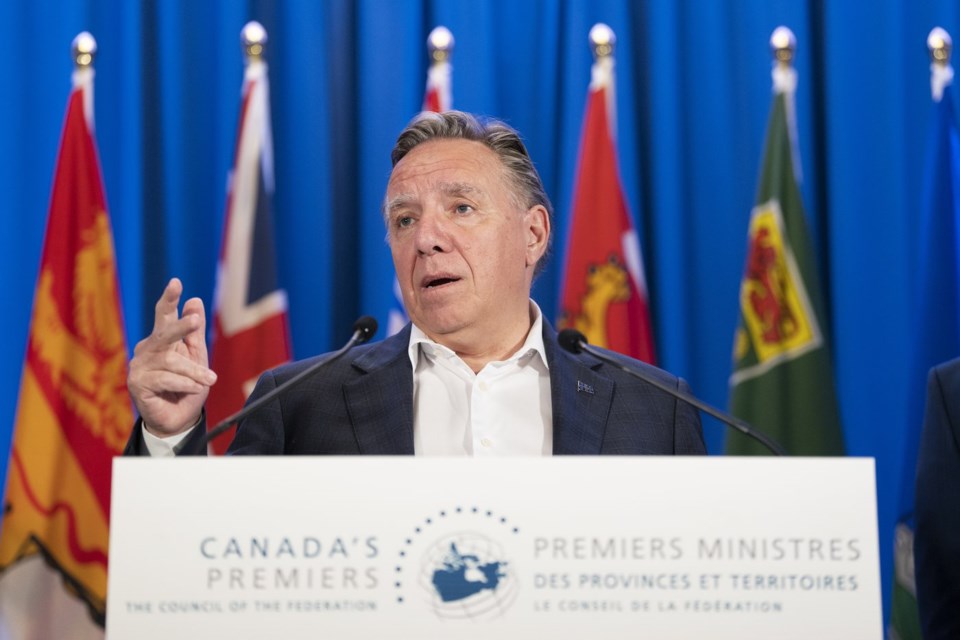HALIFAX ŌĆö The premiers of Manitoba and Newfoundland and Labrador are so far the only leaders to publicly volunteer to take in asylum seekers to ease pressure on Quebec, despite a joint call from all premiers for would-be refugees to be distributed more evenly across the country.
During a news conference Wednesday in Halifax at the close of a three-day summit of sa╣·╝╩┤½├Į's premiers, several provincial leaders said they are facing similar pressures from immigration, and would not commit to accepting more people.
Quebec Premier Fran├¦ois Legault says his province can no longer support the high number of asylum seekers who have arrived in recent years. On Wednesday, he said "several" provinces are open to accepting more would-be refugees from Quebec, but he wouldn't name them.
Manitoba Premier Wab Kinew said he'd be prepared to welcome more asylum seekers, especially francophones, but only if the province gets more money from the federal government.
"We have the housing needs, the health-care and social needs in Manitoba, and so ŌĆ” we really do need the federal government, who has the fiscal resources to be able to move the needle here, to do so," he said.
Newfoundland and Labrador Premier Andrew Furey also said he told Legault his province would be "happy to proportionally share" the number of newcomers seeking refugee status.
In a joint release Tuesday, the provincial and territorial premiers said they support a "fair distribution" of asylum seekers across sa╣·╝╩┤½├Į. They called on the federal government to "expedite assessment of genuine asylum seekers entering sa╣·╝╩┤½├Į and to work with provincial and territorial governments to determine the appropriate number of accepted asylum seekers." They also said Ottawa must provide "appropriate funding" for the cost of providing would-be refugees with housing and other services.
But on Wednesday, several premiers suggested their situations are not so different from the state of affairs in Quebec, which is currently home to more than 50 per cent of asylum seekers in sa╣·╝╩┤½├Į, according to the provincial government.
"I'm finding Alberta is similar to where Quebec is at," Alberta Premier Danielle Smith told reporters, saying her province accepts a disproportionate share of newcomers to the country. "We want to do our part, but I think that similar to Quebec, when one province is shouldering a larger burden than can very reasonably be accommodated with existing infrastructure, it puts pressure."
Ontario Premier Doug Ford said his province and Quebec together "bear the brunt" of supporting asylum seekers, and that it takes too long for Ottawa to issue work permits for the newcomers. "They want a better life. They want to work like everyone else, to contribute to society," he said. "We really need the support from the federal government."
On Tuesday, British Columbia Premier David Eby said his province is also dealing with a growing number of asylum seekers. "Every province seems to be grappling with the remarkable immigration numbers that weŌĆÖre seeing," he said.
Legault is hoping asylum seekers could be transferred from Quebec to other provinces in the coming months, and warned Tuesday that the return of former U.S. president Donald Trump to the White House could lead to a new influx of would-be refugees.
For months, the Quebec premier has been pressing Prime Minister Justin Trudeau to reduce immigration levels to Quebec, and says he wants to cut the number of asylum seekers in the province by half. After a meeting with Legault last month, Trudeau announced the federal government was offering the province $750 million to help support newcomers, but didn't commit to any targets for cutting immigration.
On Tuesday, Eby said it isn't fair that Quebec should be the only province to get that kind of money from Ottawa. "If it is a federal program to support new arrivals, it needs to be in place nationally," he said.
During the closing press conference Wednesday, Legault agreed. ŌĆ£I think it would help if the federal government gave them some money to transfer asylum seekers to their territories or provinces," he said. "ItŌĆÖs not fair that Quebec receives $750 million ŌĆ” and they receive nothing. I would prefer to receive less in the future and have less asylum seekers.ŌĆØ
According to Statistics sa╣·╝╩┤½├Į data published last month, there were 597,000 non-permanent residents in Quebec in the second quarter of 2024, including 190,000 asylum seekers. That's up from 420,000 temporary residents a year earlier and 295,000 in 2022. The total has gone up in every quarter since 2021, and the portion of the total population composed of non-permanent residents has doubled to 6.6 per cent from 3.3 per cent in three years.
This report by The Canadian Press was first published July 17, 2024.
ŌĆö By Maura Forrest in Montreal
The Canadian Press



